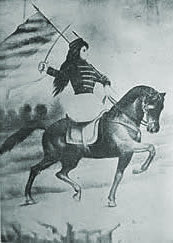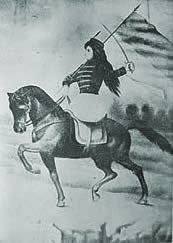
|
Women and Independence in Latin America An exploration of women's involvement in the Latin American Wars of Independence |

|

|
Women and Independence in Latin America An exploration of women's involvement in the Latin American Wars of Independence |

|
Gender:Female
Ethnic origen: White
Events:
| 1783 | - | Bucaramanga | - | Not applicable | - | She was born Bucaramanga, Colombia in 1873. |
| 1801 | - | Colombia | - | Unknown | - | She married Dr. Miguel Valenzuela Mantilla. |
| 1822 | - | Colombia | - | Patriot | - | She was condemned to perpetual imprisonment. |
| 1841 | - | Bogotá | - | Unknown | - | She died in Bogotá in 1841. |
Connections:
Comuneros RebellionBiography:
She was born in Bucaramanga in 1783, the daughter of Manuel Mutis Bossio, of Cadiz and María Ignacia Consuegra of Girón, New Granada and niece of the botanist, José Celestino Mutis (born, 1732, Cádiz). As a member of the upper class, she was educated as a child in Santafé, where she lived with her uncle José Celestino. Mutis Bossio, Mayor of Bucaramanga, was nonetheless a rebel leader during the comunero rebellion of 1781. He then retired from royal service and worked as a comerciante until his death in 1786. In 1801 Micaela Mutis married Dr. Miguel Valenzuela Mantilla, lawyer of the Real Audiencia and a member of the Republic’s 1st Congreso Constituyente. They had 6 sons and a daughter.
During the Independence struggle the Mutis family was on the rebels’ side. Micaela’s brother Sinforoso was accused of circulating ideas of independence and was detained in a Spanish prison, and her other brothers were imprisoned and exiled. The Valenzuelas were pro-royalists. In 1816 during Pablo Morillo’s reconquista for the Spanish, he honoured the Valenzuelas. In 1819 Bolívar triumphed, the Viceroy and his court fled north to Maracaibo, with them Valenzuela Mantilla. Micaela was left behind in Girón, 4 months pregnant.
In 1822 Valenzuela accused his wife of double and incestuous adultery with the Republican Mayor of Girón, Juan Bautista González Serrano. (There are no clues of whether or not this charge was justified.) He asked for a separation and the division of property that Micaela had managed. Once her husband had obtained Micaela’s family property, he wrote to forgive her and voiced his desire for a reconciliation.
In 1822, Micaela was condemned to perpetual imprisonment; González was exiled. She died in Bogotá in 1841. (Martínez Carreño, 215-220)
References:
Campuzano, Luisa (editor). (1997) Mujeres latinoamericanas: Historia y cultura siglos XVI al XIX